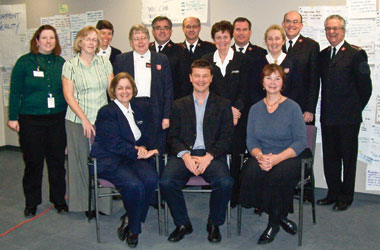 Recognizing the growing need for Salvation Army leaders, a group of Salvationists from across the territory met December 8 at territorial headquarters to discuss a territorial leadership development strategy. Participants acknowledged that leadership in these days is increasingly complex and demanding. In future, leaders may be in short supply if the Army does not adapt to changing needs.
Recognizing the growing need for Salvation Army leaders, a group of Salvationists from across the territory met December 8 at territorial headquarters to discuss a territorial leadership development strategy. Participants acknowledged that leadership in these days is increasingly complex and demanding. In future, leaders may be in short supply if the Army does not adapt to changing needs.
Facilitators Carol MacKinnon and Charles Holmes inspired participants to think about a concrete plan for leadership development. Helping articulate the strategy were Colonel Donald Copple, chief secretary, Lt-Colonel Jean Moulton, secretary for personnel, Major Mona Moore, (leadership development secretary), Lt-Colonel Floyd Tidd, divisional commander, Ontario Central-East Division, Major Fred Waters, area commander, Prairie and Northern Territories Division, as well as representatives from Booth College, the Ethics Centre, the College for Officer Training and experts in leadership development, human resources, business administration and spiritual direction.
What emerged was a Vision of Leaders in 2015. This vision includes a growing diversity (gender, age, ethnicity, etc.) among leaders at all levels and individualized personal development plans and career paths for officers and lay employees. These plans will reflect individuals' aspirations as well as the organization's leadership needs. The group also anticipates that all new officers will be educated in a style of leadership that uses the concept of coaching as its guiding philosophy.
The team committed to a series of specific projects, including:
- the creation of an education and training council to provide territorial oversight of leadership development and harness best practices
- the recruitment of some non-traditional lay leaders into executive roles
- the ongoing development of all officers and lay leaders as leader coaches
- an assessment of the curriculum at the College for Officer Training, with links to Booth College's programming
- research into the specific values of new recruits and candidates with a focus on Generation Y/Millennials (those in their mid-20s or younger)
- intentional contact with leaders to value their diverse gifts and contributions, and to encourage their continued development
- a pilot project on succession planning in key non-reserved roles (those not established by IHQ)
“The Canada and Bermuda Territory has developed many wonderful leaders,” notes Major Mona Moore. “The current challenge is to leverage experiences of the past to meet present and future challenges. The culture of the emerging Army needs to be diverse and flexible enough to attract and retain a broad range of adherents, soldiers, employees, officers and lay leaders at every level.”
Photo: Participants in the planning session surround Mjr Mona Moore, leadership development secretary, and Charles Holmes and Carol MacKinnon, facilitators









Comment
On Friday, March 6, 2009, Joan Blanchard said:
On Wednesday, March 4, 2009, David Stam said:
Unless the Army begins to look at and attempt to re-estalbish that which made it great in days gone by I am afraid the drift will continue. I am not saying it must be the Army it was 50 or 60 years ago, but unless we begin to reemphasize that which made it strong, at least at the corps level the buildings will continue to empty until they are closed.
We all know what made corps work strong.....dedicated, godly officers, caring local lay leadership,and Salvationist family life where the word of God was taught and lived
I realize that times have changed, and the Army was obliged to change somewhat as well. We are not the only Chirstian demonination that has been caught in the cross fire of the society we live in. But in an effort to be many things to many people it has really ceased, at least at the corps level,to be much to anyone.
I do hope and pray that this Leadership Development Strategy will be effective and assist the Army as it attempts to move forward in dealing with the internal and external challenges it faces.
Leave a Comment